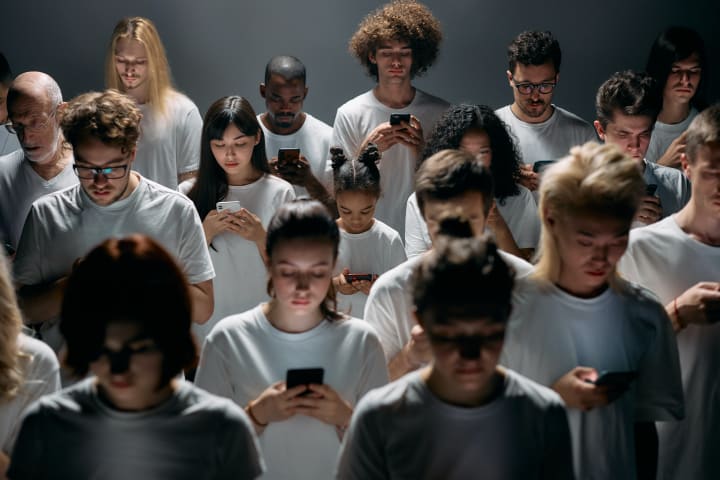
Introduction
In the digital age, technology has woven itself into the very fabric of our lives, revolutionizing the way we communicate, work, and access information. While these advancements have undoubtedly brought convenience and efficiency, the pervasive nature of technology also raises concerns about its impact on mental health. From the allure of social media to the addictive pull of digital devices, our relationship with technology is a double-edged sword, offering both benefits and risks. In this thought-provoking insight, we explore the complex interplay between technology and mental health, delving into the potential consequences and suggesting ways to foster a healthier digital balance.
The Promise of Connection: Social Media and Mental Well-being
Social media platforms promise to connect us with friends, family, and like-minded individuals across the globe. Yet, beneath the façade of connectivity, social media can trigger feelings of isolation, inadequacy, and comparison. The relentless stream of carefully curated images and highlight reels can lead to "social media envy," where individuals feel their lives pale in comparison to the seemingly perfect lives of others. This constant comparison can foster anxiety and self-doubt, jeopardizing mental well-being.
The Digital Rabbit Hole: Information Overload and Mental Exhaustion
The digital age inundates us with a barrage of information, news, and updates 24/7. While this accessibility enhances knowledge, it also contributes to information overload and mental exhaustion. The need to stay updated can lead to compulsive checking of news and notifications, resulting in heightened stress and a sense of being overwhelmed. In this era of constant connectivity, we must learn to set boundaries and manage our screen time to preserve mental clarity and focus.
Tech Addiction: Escaping the Real World
The allure of digital devices and their captivating content can lead to tech addiction, where individuals become reliant on technology to escape from real-world challenges or emotions. Binge-watching shows, gaming for hours, or endlessly scrolling through social media can become coping mechanisms for stress or loneliness. As a result, individuals risk neglecting their real-life relationships and responsibilities, exacerbating mental health issues.

Sleep Disruptions: The Blue-Light Menace
The widespread use of smartphones and tablets has introduced a new foe to quality sleep: blue light. The blue light emitted by screens can disrupt melatonin production, leading to sleep disturbances and insomnia. Chronic sleep deprivation, in turn, impacts mood, cognition, and overall mental health. Setting digital curfews and adopting "bedtime tech rituals" can aid in restoring healthy sleep patterns.
The Impact on Adolescent Mental Health
Adolescents are particularly vulnerable to the impact of technology on mental health. Social media, cyberbullying, and online peer pressure can contribute to feelings of anxiety, depression, and low self-esteem. Moreover, excessive screen time can interfere with healthy social development, as face-to-face interactions are replaced by virtual connections. It is crucial for parents, educators, and policymakers to address these concerns and advocate for a balanced digital lifestyle among young individuals.
Positive Tech Solutions: Embracing Mental Health Apps
Not all technological advancements have negative implications for mental health. In recent years, mental health apps have emerged as powerful tools for improving well-being. From meditation and mindfulness apps to mood tracking and therapy platforms, these digital solutions provide accessible support for individuals seeking mental health assistance. When used responsibly and in conjunction with professional guidance, these apps can promote self-awareness and mental resilience.
Nurturing a Healthy Digital Balance
The key to mitigating the negative impact of technology on mental health lies in nurturing a healthy digital balance. This involves practicing mindfulness with technology use, being intentional about screen time, and setting boundaries to create tech-free moments for self-reflection and relaxation. Cultivating meaningful real-life connections, engaging in hobbies, and spending time in nature can also counterbalance the isolating effects of technology.
Conclusion
The impact of technology on mental health is a complex tapestry of advantages and challenges. While technology offers unprecedented connectivity and convenience, it also poses risks to mental well-being. Social media comparisons, information overload, tech addiction, sleep disruptions, and the vulnerability of adolescents to online pressures are just some of the issues that demand our attention.
To navigate this digital age mindfully, we must be proactive in fostering a healthy digital balance. By setting boundaries, cultivating face-to-face connections, and embracing positive tech solutions, we can harness the benefits of technology while safeguarding our mental well-being.
Ultimately, the responsibility lies with both individuals and society as a whole to recognize the potential impact of technology on mental health and work collaboratively towards creating a digital landscape that promotes mental wellness and human connection. By using technology mindfully, we can unlock its true potential to enhance our lives while preserving the delicate fabric of our mental health and overall well-being.
About the Creator
Abel A.
A writer which has learned from the different spheres of life and an ardent cryptocurrency head






Comments
There are no comments for this story
Be the first to respond and start the conversation.